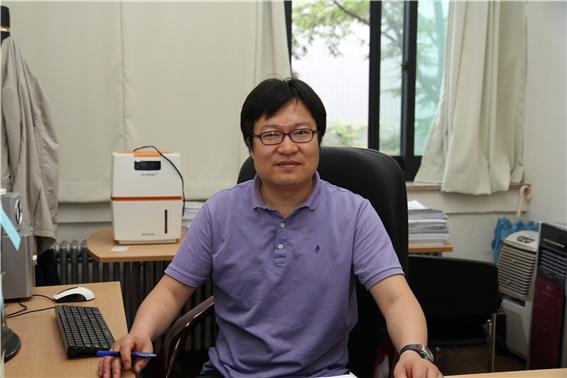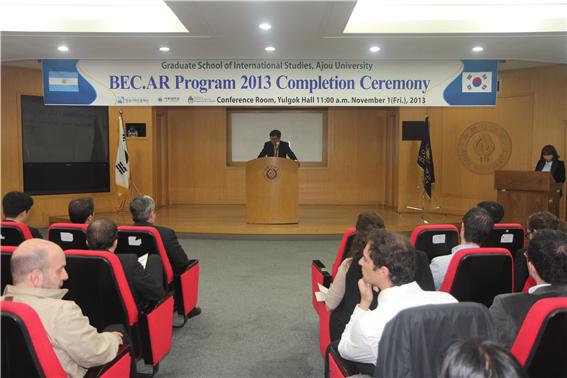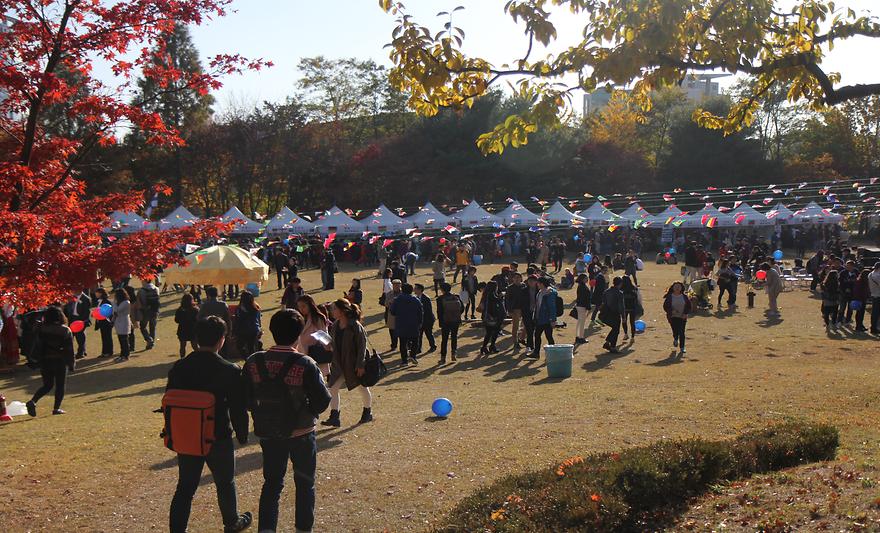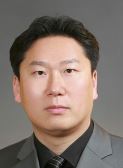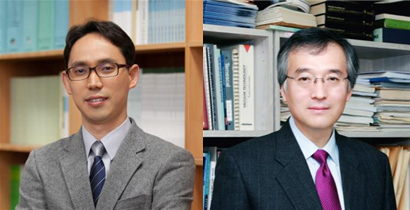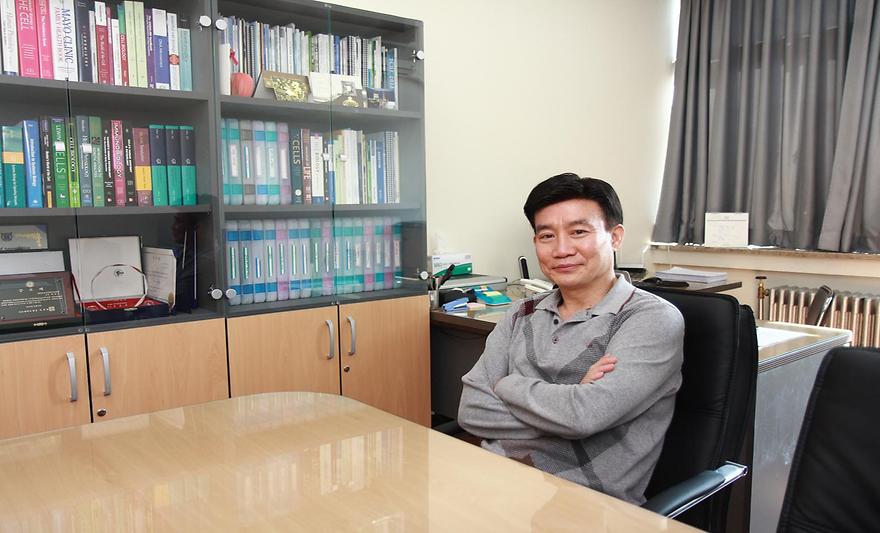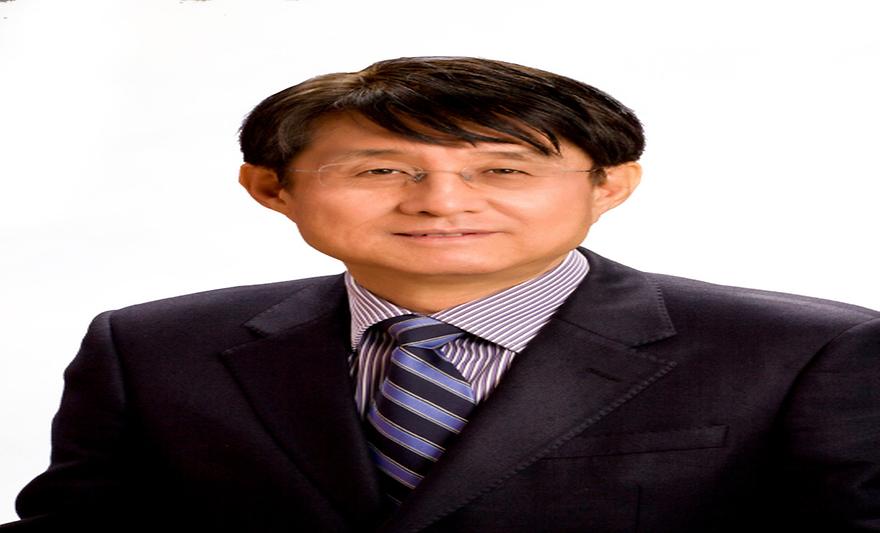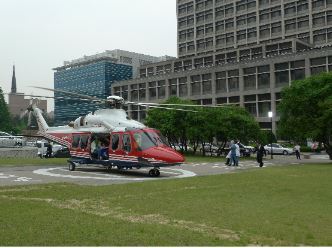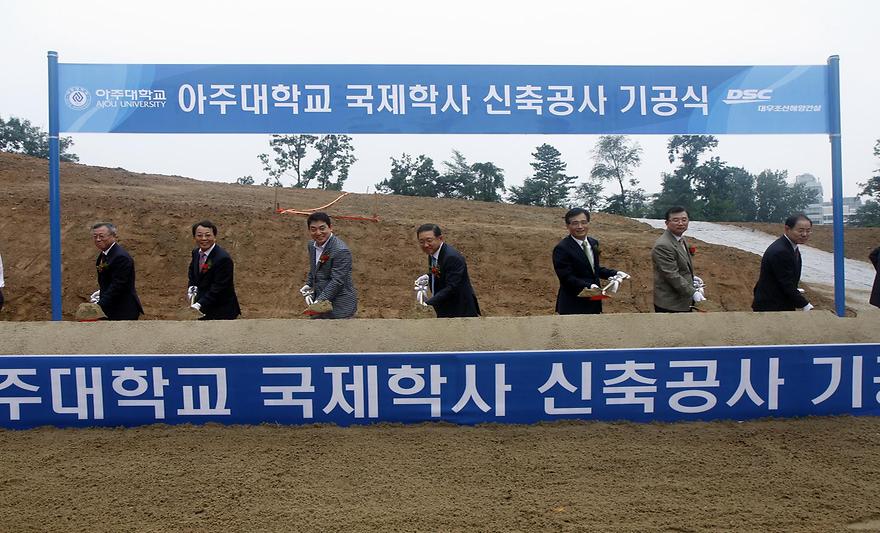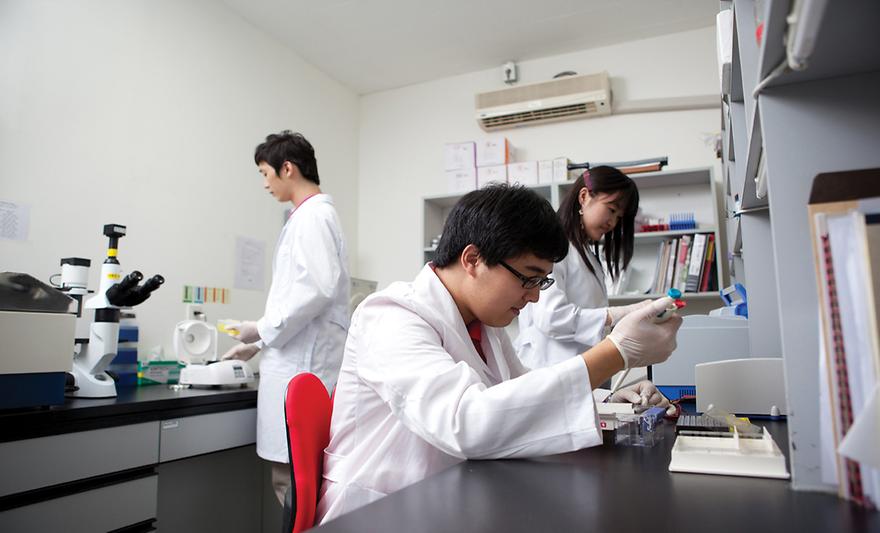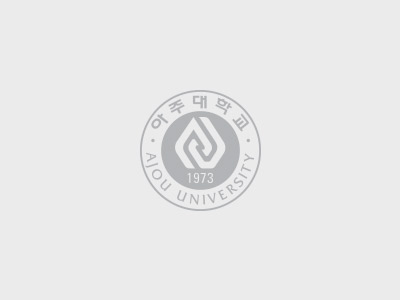-
Professor Joo-min Kim and team ascertain core principle of portable blood analyzerProfessor Joo-min Kim (pictured) of the Energy System/Chemical Engineering Department of Ajou University and his team recently identified the phenomenon of micro particles “lining up” in low a concentrate DNA solution. This research is expected to contribute greatly to the future development of portable blood analyzers. The research was published in the online edition of the international academic journal Nature Communications.The Ministry of Science, ICT and Future Planning announced the finding on Nov. 13, stating that Professor Kim and his team had ascertained a central lineup of particles sized in the several micro meters (1/1 mil of 1 meter) in the flow of a low concentrate DNA solution.This research outcome is expected to facilitate the future development of micro electrochemical impedance biosensors, devices which enable individuals to conduct blood exams at home, eliminating the need to visit hospitals for the procedure. This is because portable blood analyzers require condensation technology for micro particles, such as cells, in order to ensure the accuracy of analysis. Existing blood analysis devices require additional equipment, such as complexly structured channels or electricity generators.Professor Kim said, “Once this research develops further, the commercialization of not only portable blood analyzers but also high-performance cell analyzers can be accelerated.”Kyo-won Kang, a graduate student in the Energy System Department of Ajou University, was first author of the paper.
-
25
- 작성자OIA
- 작성일2013-12-03
- 35863
- 동영상동영상
-
Ajou holds “Argentina BEC.AR” completion ceremonyThe Graduate School of International Studies at Ajou University held, on Nov. 1, the “Argentina BEC.AR” completion ceremony in the Conference Room in Yulgok Hall. BEC.AR is a program that was founded by the Argentine Government in which talented, qualified individuals receive full funding from the Government to study abroad. Twenty-nine individuals from academia, companies, and research institutes in Argentina have been studying at Ajou University since August.The program, sponsored by the Prime Minister’s Office of Argentina, was initiated with the purpose of developing science technology experts. Specifically, the Government of Argentina selected 268 science and technology experts from governmental agencies, companies, and academia and dispatched them to Korea, the United States, France, Italy, and Brazil to advance their skills. The full tuition fees for the 29 students studying at Ajou University were borne by the Government of Argentina.Notably, Ajou University was the only educational institution in Korea to be selected for participation in the project. Prior to the students entering Ajou University, a tripartite agreement was signed between Ajou, the Korea Foundation for the Promotion of Private School, and the Prime Minister’s Office of Argentina, stipulating program operation for the next three years.Participants in the BEC.AR program have the opportunity to take innovation management in business and industry courses; IT, BT and NT courses; and Korean language courses. Students also participated in various field trips throughout the study period, including company visits, and attend special lectures geared to their areas of study. This program is a shortened version of the one-year research curriculum of the graduate school, reduced in duration to 3 months. Each trainee attended a total of 432 hours (27 credits) of classes. The curriculum was developed and headed by Dean of the Graduate School of International Studies Jae-ik Lim and professors from the colleges of engineering, information communications, and business management.One trainee, Hernan Gabriel Curras, aged 29, an IT engineer, shared his impressions of the experience by saying, “The quality and passion of the faculty were very impressive, and in particular, I was delighted to meet in person the corporate CEOs and government officers who led the ‘Miracle of Han River’ during the special lecture series.”He added, “By utilizing the things I have seen, heard, and just generally experienced at Ajou University, I hope I can grow as an IT engineer and a businessman in my home country.”
-
23
- 작성자OIA
- 작성일2013-12-03
- 31270
- 동영상동영상
-
“Ajou International Day” celebrates the university’s culturally diverse student body“Ajou International Day,” held on the lawn square beside the sports stadium on Nov. 7, offered a great opportunity for the foreign students at Ajou University to introduce the cultures and foods of their home countries. Around 600 students from 44 countries participated in this year’s event, running booths that showcased the traditional attire, foods, and others characteristics of their home countries.This year’s program began at 11 am with the opening ceremony followed by a series of events, including a congratulatory performance by the Martial Arts 24th Group BEAT, a tug-of-war, and a talent show. President of Ajou University Dr. Jae-hwan Ahn, vice dean of the College of Medicine Euy-young Soh, dean of the Graduate School Jae-suk Yoo, as well as the deans of various other colleges and departmental heads, all attended the event. Representatives from the embassies of Uzbekistan, Ghana and Vietnam as well as members of Shandong University in China and Ajou’s sister universities in China were present as well.Participants were also given the opportunity to experience traditional Korean folk games like neolttwigi (similar to the see-saw), tuho (throwing sticks into a canister), and jae-ki-cha-hi (kicking shuttlecock game) and try on traditional Korean wedding attire.About the event, President of Ajou University Dr. Jae-hwan Ahn commented, “I hope that Ajou International Day will serve as an opportunity for mutual understanding and exchange between and among local and overseas students.”
-
21
- 작성자OIA
- 작성일2013-12-03
- 30243
- 동영상동영상
-
Professor Kim Dong-wan’s Research Team Develops New Bacteria-Powered Battery The team led by Professor Kim Dong-wan of the Department of Energy Systems in Ajou University has succeeded in synthesizing a nano powder that could be used on the electrodes of supercapacitors located on the surface of bacteria. This development is significant in that the process is relatively simple and effective in synthesizing metal oxide powders capable of being used as high-performance electrode materials that are environmentally-friendly at room temperature. The supercapacitors have a lower energy density than a lithium ion battery but are capable of rapid recharging and discharging a high power density. The supercapacitors represent a next-generation energy storage device that are highly efficient and semi-permanent and can be used as an alternative for subsidiary batteries or battery substitutes. Professor Kim’s discovery was published in the online edition of Scientific Reports, on July 31, under the title, “Scalable One-pot Bacteria-Templating Synthesis Route toward Hierarchical, Porous-Co3O4 Superstructures for Supercapacitor Electrodes.” Synthesizing a nanopowder using high-molecular biomaterials, such as DNA, proteins and viruses, produces unique structures due to their diversity of shapes and properties; moreover, the surface area is large and can be produced at a lower temperature. However, the high price of high-molecular biomaterials, the complexity of the process and lower yield were limitations of this process. The Team led by Professor Kim has synthesized a cobalt oxide nano powder at the gram level on the surface of bacteria. This means large quantities can be gained through easy manipulation. The team increased the yield to the gram level from the previously obtained micro- and milligram levels. The produced cobalt oxide has a large surface area and micro pores and is anticipated to be applied as a material for electrode in devices such as next-generation energy storage devices. The micrococcus is a 0.5-1 micrometer sized round-shaped bacteria surrounded by a thick cell wall composed of various negatively charged functional groups to which metal cations can easily adhere. Therefore, the transition metals, including the cobalt oxides, are used as the material for electrodes due to their high capacitance due to oxidation reduction exchanges compared to the existing active carbon electrodes. The yield was improved due to the high yield of bacterial reproduction, their amenability to genetic modification, and strong absorption of metallic ions to the cell walls. Absorption occurs due to the electrostatic tension between the negatively charged cell walls and positively charged cobalt ions. The powder is also easy to obtain as it can be processed in a solution at room temperature and under normal pressure. The synthesized cobalt oxide powder is expected to contribute to increasing the capacitance and longevity of the supercapacitors. This is because the density of energy storage will increase due to the larger area of contact for ions in the electrolyte due to the micro pores between the powder particles spread evenly on the surface of the bacteria. In addition, the storage efficiency will be maintained at greater than 95% even after 4,000 recharges and discharges. The speed of the charging will also be increased. Professor Kim explained that the outcome of this study is the "process of synthesizing a metal oxide nano powder of various compounds that could be used as a material for the electrodes to be used in next-generation energy storage devices that provide a higher yield." Shim Hyeon-woo, a doctoral candidate in energy systems and the first author of the research paper, mainly led the research project. The co-researchers included Professor Kim Du-heon of the Department of Molecular Science and Technology and his research team, who helped with bacterial cultivation. Images <Diagram of a Bacteria-Templating Route for Synthesizing a Cobalt Oxide> (a) Micrococcus template(b) Cell wall structure including bacteria template functional groups(c) Bacteria template negatively charged due to functional groups(d) Diagram of a bacteria-templating route for synthesizing cobalt oxide
-
19
- 작성자OIA
- 작성일2013-11-11
- 31386
- 동영상동영상
-
-
17
- 작성자OIA
- 작성일2013-11-11
- 30580
- 동영상동영상
-
Professor Choi Sangdun Wins National Academy of Sciences AwardProfessor Choi Sangdun of the Department of Life Sciences at Ajou University has been named the recipient of the 58th National Academy of Sciences (NAS) Award in the basic natural sciences category. Professor Choi received his award and a gift of KRW 50 million at the NAS building in Seocho-gu, Seoul, on September 13.The NAS announced on July 12 its decision to award Professor Choi along with four other professors this year’s NAS awards. Specifically, Professor Lee Yong-il of Seoul National University was the co-winner of the award in the basic natural sciences category along with Professor Choi. Professors Choi Jeong-yeon and Han Jae-yong, both of Seoul National University, were co-winners in the applied natural sciences category, and Dr. Kim Jong-geon, now professor emeritus at Korea University, received the award in the humanities category.The NAS honors scientists and researchers whose scholarly works and publications have made undeniable contributions to the advancement of learning. The award contenders are nominated by major academic societies in Korea or abroad, or by members of the NAS, and the winners are finally selected based on their performances in by-category and general evaluations and reviews, and ratified by the NAS general assembly.The NAS, first established in 1954, supports scholarly research, international academic exchange, and policymaking that encourages learning and academic achievement. The organization has 139 members as of 2013.
-
15
- 작성자OIA
- 작성일2013-11-11
- 30083
- 동영상동영상
-
Professor Lee Kun-mo Publishes World’s First Sustainable Engineering HandbookProfessor Lee Kun-mo of the Department of Environmental Engineering at Ajou University has published his Handbook of Sustainable Engineering through Springer, the world’s largest academic publisher. This book is the first of its kind in the world to provide a comprehensive review of all the major theories and approaches in sustainable engineering.The book consists of 65 chapters on seven topics, including sustainable production, sustainable consumption, new and advanced materials, water resource management, future sources of energy, and sustainability education and policymaking. World renowned experts on sustainable engineering wrote each chapter.Professor Lee not only contributed a chapter of his own, but also devised the list of contributors, and reviewed and edited the collected chapters over three years.“Those who have contributed to the making of this book are globally renowned experts on sustainable engineering,” remarked Lee. “Europe and Japan may be leaders of sustainable technology now, but I am proud to be a Korean author and editor-in-chief of a book of this kind and scale.”Notably, Dr. R. K. Pauchauri who heads the United Nations Intergovernmental Panel on Climate Change—winner of the 2007 Nobel Peace Prize—in his forward to the book praised it as “an excellent tool for brightening the future of sustainable engineering.
-
13
- 작성자OIA
- 작성일2013-11-11
- 30688
- 동영상동영상
-
Ajou University Hospital to Receive Expansive Support for its New Trauma Center Building in 2013The Ministry of Health and Welfare (MOHW) has selected Ajou University Hospital (AUH) as a recipient of governmental assistance under its Project to Support Regional Trauma Centers that began last year. The hospital plans to build a new trauma center building on the site currently occupied by the mortuary, a project scheduled for completion in 2015.Specifically, the MOHW will provide AUH with KRW 8 billion(approximately 8 million USD) in funding to cover the facilities and equipment required in the center, and KRW 720 million(approximately 720,000USD) for workforce recruitment and the establishment of an advanced patient transport system. This support is in addition to that promised previously by Gyeonggi-do Province of KRW 20 billion(20 million USD) and AUH’s own investment of KRW 14.4 billion(14.4 million USD).The new building will consist of one floor underground and five floors aboveground. Once completed it will have 50 patient beds in the intensive care unit and 70 for general care patients; 34 operating rooms; advanced imaging equipment; and the highest-level medical consultation and trauma treatment and recovery services. The hospital plans to open a provisional trauma center with 20 beds for intensive care patients in November of this year.A regional trauma center is a facility staffed with trauma specialists who treat transferred patients suffering from serious injuries. The government’s project for supporting regional trauma centers began last year with the goal of providing specialized trauma services for patients in less than one hour of an injury’s occurrence, thereby reducing preventable death rate from 35 percent to 20 percent or below. Regional trauma centers are currently being operated at AUH, Gachon University Gil Medical Center, Yonsei Severance Hospital at Wonju, Dankook University Hospital, Mokpo Hankook Hospital, Kyungpook National University Hospital, Ulsan University Hospital, Eulji Medical Center, and Chonnam National University Hospital.
-
11
- 작성자OIA
- 작성일2013-11-11
- 30804
- 동영상동영상
-
-
9
- 작성자OIA
- 작성일2013-11-11
- 30234
- 동영상동영상
-
Five Teams Finalized for the BK21 Plus Program Five research teams from Ajou University were chosen for the BK21 Plus Program (Brain Korea 21 Program for Leading Universities and Students) hosted by the Ministry of Education (MOE) and the National Research Foundation (NRF). The BK21 Plus is the second phase of the BK21 governmental program initiated by the MOE, with the objective of developing talents at the master's and doctoral level. The MOE announced, on August 16th, the 195 research groups and 280 research teams, from 64 universities nationwide, for this program. Two research groups and three teams were selected from Ajou University. Notably, a research group is a unit that applies to the faculty level of a department of a graduate school; whereas, a research team refers to a smaller unit that is applied by each professor. The two groups chosen as research groups are the Convergence-Based Future Energy System Program headed by Professor Kim Ki-hong of the Department of Energy Systems and the Molecular Science and Technology Program headed by Professor Lee Bun-yeoul of the Department of Molecular Science and technology. Both groups deal with the convergence of multiple scientific and technological disciplines. The Convergence-Based Future Energy System Program Group, in cooperation with researchers in physics, chemistry, material engineering, chemical engineering and energy, will determine means to establish environmentally-friendly sustainable energy systems and will conduct research into energy systems for next-generation transportation devices as well as develop and commercialize original energy technologies. The Molecular Science and Technology Program Group will conduct technology transfer and develop experts in related areas by producing superior research papers and securing original patents through basic research in the area of chem-bio (integrated area of applied chemistry, biotechnology, dentistry and pharmacology). On the other hand, the three teams chosen as finalists are the Autonomous Networking Software Research Team for Smart Inter-device Collaboration led by Professor Ko Young-bae; the Innovative Digital Manufacturing System Research Team headed by Professor Park Sang-chul; and the Reliable Mobile Software Workforce Development Team led by Professor Jeong Tae-Sun. The selected research groups and teams will receive financial support for graduate student research scholarships, new researcher labor costs and operational costs until 2019 (pending an intermediate evaluation in 2015). This year, a total of KRW 2.469(approximately 2.469 million USD) billion will be provided to five research groups and teams from Ajou University.
-
7
- 작성자OIA
- 작성일2013-11-11
- 31825
- 동영상동영상
-
-
5
- 작성자OIA
- 작성일2010-10-07
- 37992
- 동영상동영상
-
Four Ajou University Students, Awarded at the Student Invention ContestFour students of Ajou University earned a glory of winning prizes at the 9th Student Invention Contest.Student Oak Sang-ho(06, Electrical and Computer Engineering) won the grand prize, and Kim Hyeon-woo(06, E-business), Lee Kyu-ri(10, E-business) and Seo Wook(02, Mechanical Engineering) won the second prize, third prize and participation prize respectively.All of the winners had taken \'patent invention\' and \'creativity\' classes from professor Choi Seung-chul(Department of Energy) and professor Lim Mi-ra(University College). It can be said that their achievement is attributable to the teaching and support of the two professors.Student Invention Contest is an annual nationwide competition where elementary school, middle school, high school and university students including the students serving in the army can come up with excellent ideas for the development of the national industries. There is an increase in the submission of a variety of high-quality inventions year after year. This year, 45 works were awarded among a total of 4041 works from across the country. Office of International AffairsAjou University ������������������������������������������������������
-
3
- 작성자OIA
- 작성일2010-08-30
- 38008
- 동영상동영상

